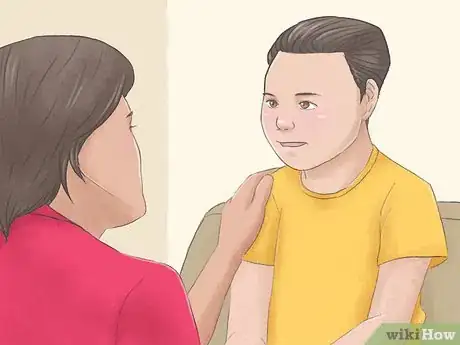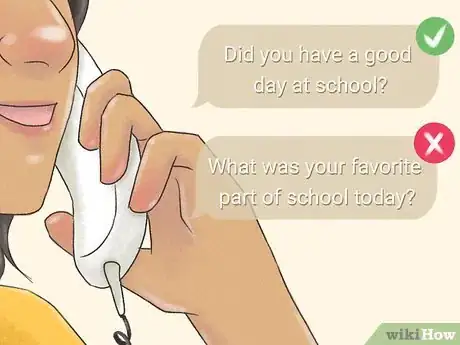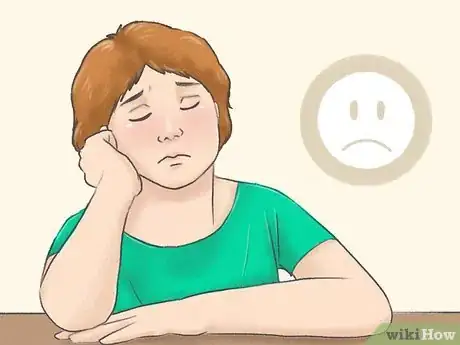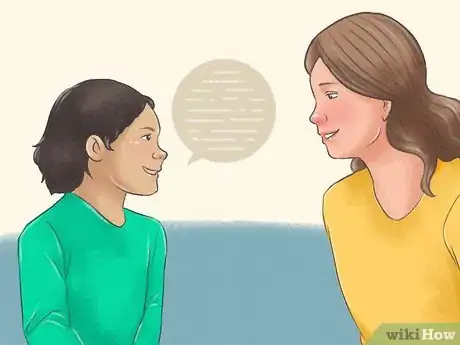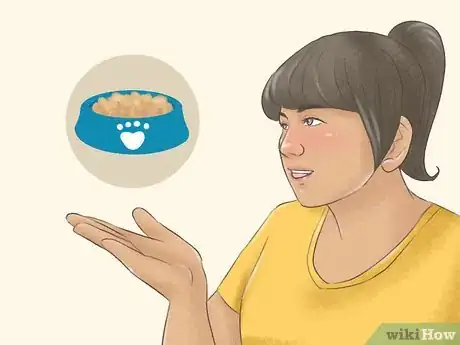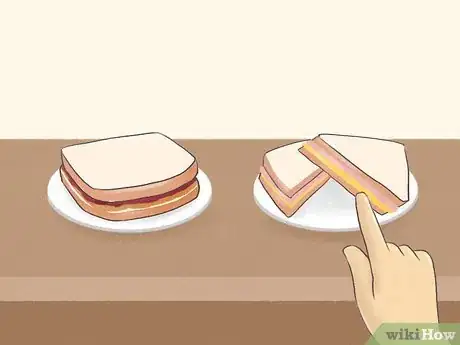This article was co-authored by Julie Wright, MFT and by wikiHow staff writer, Janice Tieperman. Julie Wright is a Marriage and Family Therapist and the co-founder of The Happy Sleeper, which offers sleep consulting and online baby sleep classes. Julie is a licensed psychotherapist specializing in babies, children, and their parents, and the co-author of two best selling parenting books (The Happy Sleeper and Now Say This) published by Penguin Random House. She created the popular Wright Mommy, Daddy and Me program in Los Angeles, California, which provides support and learning for new parents. Julie's work has been mentioned in The New York Times, The Washington Post, and NPR. Julie received her training at the Cedars Sinai Early Childhood Center.
This article has been viewed 87,810 times.
At times, talking to kids can feel like learning a foreign language. Unfortunately, there’s no handy phrasebook or translation app that can make you sound friendly, encouraging, and firm all at the same time. Don’t worry. We’ve put together plenty of conversational tips, tricks, and ideas, so you can have an open and honest chat with any kids in your life.
Steps
Expert Q&A
Did you know you can get premium answers for this article?
Unlock premium answers by supporting wikiHow
-
QuestionWhat kinds of things do older kids like to talk about?
 Julie Wright, MFTJulie Wright is a Marriage and Family Therapist and the co-founder of The Happy Sleeper, which offers sleep consulting and online baby sleep classes. Julie is a licensed psychotherapist specializing in babies, children, and their parents, and the co-author of two best selling parenting books (The Happy Sleeper and Now Say This) published by Penguin Random House. She created the popular Wright Mommy, Daddy and Me program in Los Angeles, California, which provides support and learning for new parents. Julie's work has been mentioned in The New York Times, The Washington Post, and NPR. Julie received her training at the Cedars Sinai Early Childhood Center.
Julie Wright, MFTJulie Wright is a Marriage and Family Therapist and the co-founder of The Happy Sleeper, which offers sleep consulting and online baby sleep classes. Julie is a licensed psychotherapist specializing in babies, children, and their parents, and the co-author of two best selling parenting books (The Happy Sleeper and Now Say This) published by Penguin Random House. She created the popular Wright Mommy, Daddy and Me program in Los Angeles, California, which provides support and learning for new parents. Julie's work has been mentioned in The New York Times, The Washington Post, and NPR. Julie received her training at the Cedars Sinai Early Childhood Center.
Parenting & Baby Sleep Specialist
References
- ↑ https://www.edutopia.org/article/how-talk-children
- ↑ https://www.edutopia.org/article/how-talk-children
- ↑ https://www.edutopia.org/article/how-talk-children
- ↑ https://www.edutopia.org/article/how-talk-children
- ↑ https://childdevelopmentinfo.com/how-to-be-a-parent/communication/talk-to-kids-listen/#gs.z5vfp1
- ↑ https://raisingchildren.net.au/toddlers/connecting-communicating/communicating/communicating-well-with-children
- ↑ https://raisingchildren.net.au/toddlers/connecting-communicating/communicating/communicating-well-with-children
- ↑ https://raisingchildren.net.au/toddlers/connecting-communicating/communicating/communicating-well-with-children
- ↑ https://raisingchildren.net.au/toddlers/connecting-communicating/communicating/communicating-well-with-children
- ↑ https://childdevelopmentinfo.com/how-to-be-a-parent/communication/talk-to-kids-listen/#gs.z5vfp1
- ↑ https://childdevelopmentinfo.com/how-to-be-a-parent/communication/talk-to-kids-listen/#gs.z5vfp1
- ↑ https://childdevelopmentinfo.com/how-to-be-a-parent/communication/talk-to-kids-listen/#gs.z5vfp1
- ↑ https://childdevelopmentinfo.com/how-to-be-a-parent/communication/talk-to-kids-listen/#gs.z5vfp1
- ↑ https://www.tbcs.org/uploaded/Resources/Presentations/Tools_for_Success_16/How_to_Talk_So_Kids_Will_Listen.pdf
- ↑ https://www.washingtonpost.com/news/parenting/wp/2017/02/15/how-to-talk-so-little-kids-will-listen-a-qa-with-the-author/
- ↑ https://raisingchildren.net.au/toddlers/connecting-communicating/communicating/communicating-well-with-children
